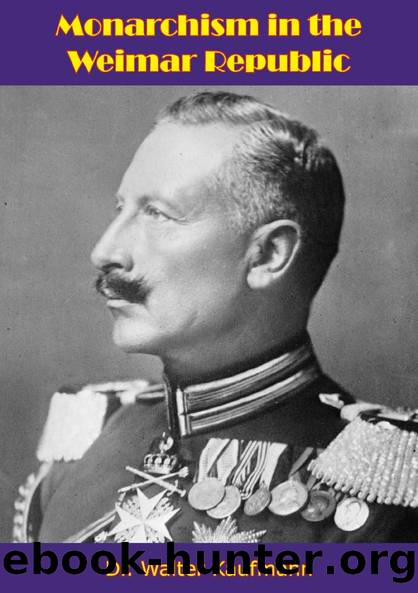Monarchism in the Weimar Republic by Dr. Walter Kaufmann

Author:Dr. Walter Kaufmann [Kaufmann, Walter]
Language: eng
Format: epub
Tags: History, Military, United States, Europe, General, Germany, Special Forces
ISBN: 9781789121087
Google: RcZQDwAAQBAJ
Publisher: Pickle Partners Publishing
Published: 2018-03-12T03:05:02+00:00
CHAPTER SIXâTHE MONARCHISTSâ DILEMMA
1. The DNVP and German Foreign Policy
The development in the years following 1925 showed clearly how much the electoral victory of the monarchists in 1925 had been truly a Pyrrhic victory: a victory paid for with the victors loss of strength. After the election of Hindenburg, the cabinet of Luther remained in office without changes. Also the program which had been accepted by the government and had been endorsed by the Reichstag under Ebertâs presidency remained the same. The strong man in the government was not its chancellor Luther, nor any of his Nationalist colleagues, but the foreign minister, Stresemann. Under his guidance and influence, foreign political considerations retained the primate in the cabinetâs policies. Yet it was precisely this foreign political program which the German Nationals found most difficult to accept. In the measure as they remained the reactionary force inside Germany they were also the champions of revisionism in foreign affairs. We have seen that the policy of rapprochement which had received an auspicious start with the acceptance of the Dawes Plan could only be launched over the grudgingly made concession by the DNVP caucus to free its parliamentary members from party restrictions. With six deputies not voting, forty-eight of the deputiesârepresenting chiefly the interests of agriculture and heavy industryâhad broken away from the powerful clique which upheld the official party platform of obstinate negation. Disregarding Germanyâs actual needs, the others would accept political and economic chaos rather than a revitalized national economy by the grace of the former enemies. Any approach to and understanding with the victor nations was denounced by the Nationals as acceptance of the Versailles treaty which contained the especially painful clause of Germanyâs war guilt. Only after the Marx government had publicly repudiated Germanyâs war guilt (although, under pressure of the Allies, no official note to this effect was dispatched to the foreign capitals), the DNVP Reichstag faction had given its members freedom to vote independently.
While the German Nationals felt to have brought the supreme sacrifice of their political principles with this compromise in the Dawes vote, the DVP considered acceptance of the Dawes plan only as an opening measure for a closer co-operation with the Western powers and for admitting Germany as a fully accepted and acknowledged power within the family of nations. The DVP did not pretend that such a policy could be accepted with enthusiasm even by some of its own partisans. Before the elections of May, 1924, when the proposed Dawes Plan was one of the most acute political issues in Germany, the party had officially declared that ânow as before the DVP opposes a policy of fulfillment, but it is nevertheless prepared to make heavy sacrifices within the framework of economic, social, and foreign-political possibilities.â{434} Again they put the welfare of the fatherlandâthat which they considered advantageous for Germanyâbefore party doctrines. And although Stresemann repeatedly, and with great passion, took issue especially with the incriminatory clauses of Versailles, he was, nevertheless, willing to accept its western territorial provisions and reaffirm them in new treaties.
Download
This site does not store any files on its server. We only index and link to content provided by other sites. Please contact the content providers to delete copyright contents if any and email us, we'll remove relevant links or contents immediately.
The Radium Girls by Kate Moore(12011)
100 Deadly Skills by Clint Emerson(4910)
Rise and Kill First by Ronen Bergman(4771)
The Templars by Dan Jones(4678)
The Doomsday Machine by Daniel Ellsberg(4480)
The Rape of Nanking by Iris Chang(4194)
Killing England by Bill O'Reilly(3989)
Stalin by Stephen Kotkin(3950)
Hitler in Los Angeles by Steven J. Ross(3937)
12 Strong by Doug Stanton(3541)
Hitler's Monsters by Eric Kurlander(3327)
Blood and Sand by Alex Von Tunzelmann(3187)
The Code Book by Simon Singh(3168)
Darkest Hour by Anthony McCarten(3117)
The Art of War Visualized by Jessica Hagy(2996)
Hitler's Flying Saucers: A Guide to German Flying Discs of the Second World War by Stevens Henry(2743)
Babylon's Ark by Lawrence Anthony(2666)
The Second World Wars by Victor Davis Hanson(2520)
Tobruk by Peter Fitzsimons(2499)
